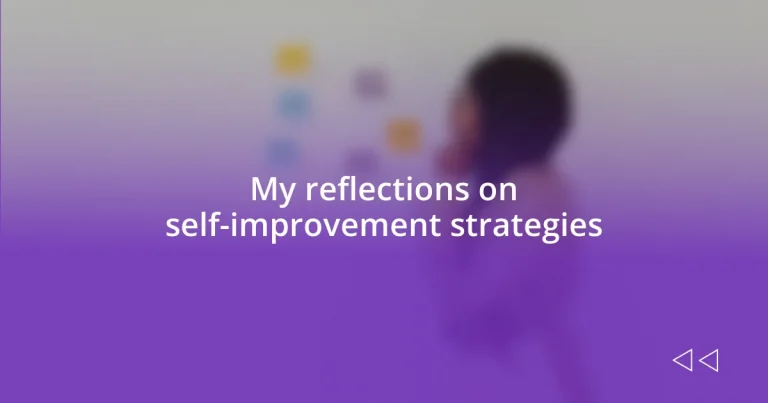Key takeaways:
- Self-improvement involves personalizing strategies like meditation, journaling, and setting realistic goals that resonate with individual needs.
- Tracking progress through journaling and apps enhances motivation and accountability, allowing for a clearer understanding of growth.
- Sustaining habits requires creating a supportive environment, incorporating accountability, and practicing self-compassion during setbacks.
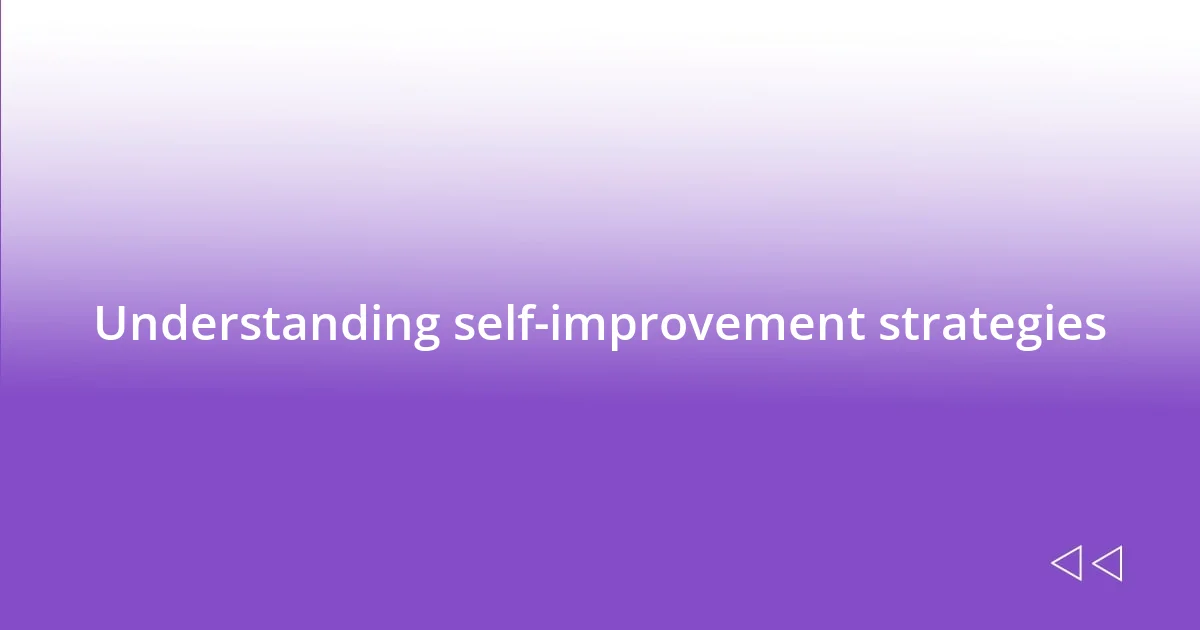
Understanding self-improvement strategies
Understanding self-improvement strategies goes beyond just setting goals. I remember when I first decided to adopt a daily meditation practice. It felt strange at first, but it turned into a profound tool that helped me gauge my thoughts and emotions, reflecting how small changes can yield significant results.
It’s fascinating how self-improvement can be tailored to each individual. Sometimes, I wonder, what if the secret to lasting change lies in understanding ourselves better? Taking time to identify what genuinely resonates with us has been key in my journey, as I’ve learned that not every strategy works for everyone.
One strategy that resonated with me was journaling; it became a mirror reflecting my thoughts. As I wrote down my experiences and feelings, patterns began to emerge—some uplifting and some challenging. Have you ever tried to sift through your own thoughts on paper? It can be a powerful way to discover insights about yourself that you didn’t even realize were there.
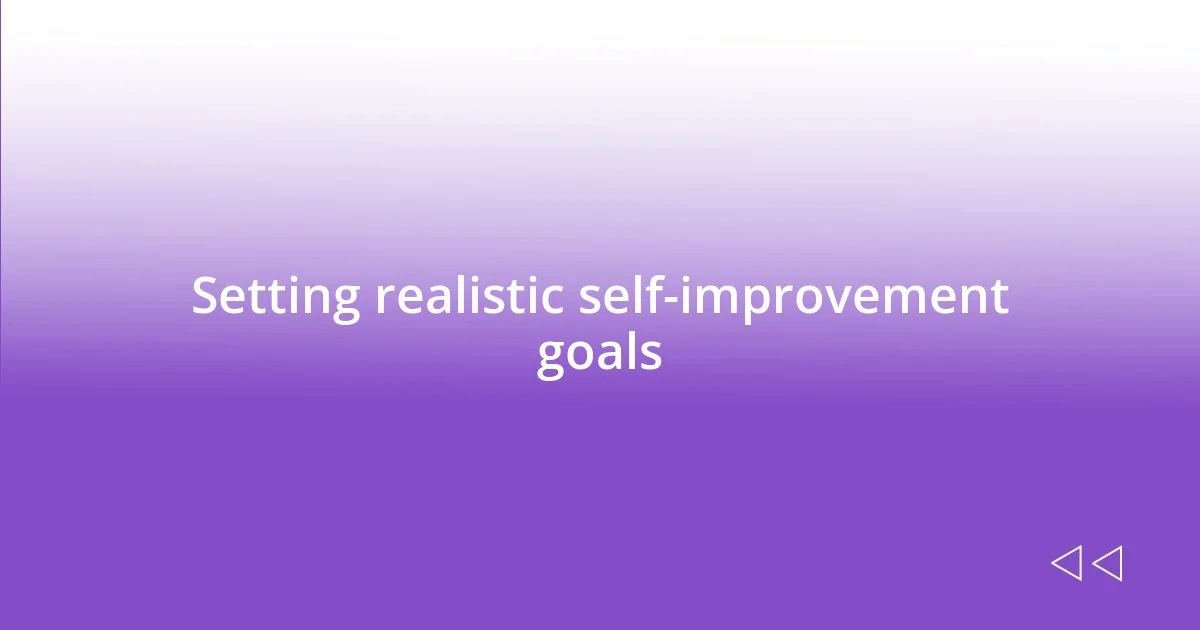
Setting realistic self-improvement goals
Setting realistic self-improvement goals is crucial in any personal growth journey. I’ve learned the hard way that dreaming big without a solid plan can lead to frustration. For instance, when I wanted to run a marathon, I started by picturing the finish line, but I soon realized I had to break it down into smaller steps—like running just a mile a day initially.
Here are some practical tips to set achievable self-improvement goals:
- Be Specific: Instead of saying, “I want to get fit,” aim for, “I will exercise for 30 minutes, three times a week.”
- Make it Measurable: Use metrics, like tracking workouts or journaling your progress, to hold yourself accountable.
- Start Small: Focus on incremental changes. This approach not only feels manageable but also builds momentum as you celebrate each victory.
- Be Realistic: Set deadlines that consider your schedule and commitments, allowing for flexibility when life gets busy.
- Visualize Success: I often close my eyes and picture myself achieving my goals; it energizes me and reinforces my commitment.
Embracing this structured approach has transformed my perspective, showing me that consistent, small efforts lead to substantial achievements over time.

Identifying personal strengths and weaknesses
Identifying personal strengths and weaknesses can feel like peeling back the layers of an onion. On my journey, I’ve often found that acknowledging my strengths gives me a confidence boost, while recognizing my weaknesses opens the door to growth. For instance, when I realized that my ability to empathize deeply with others was a strength, I began to leverage it to build stronger connections. On the flip side, accepting that I was prone to procrastination allowed me to seek strategies like time-blocking, which immensely improved my productivity.
When I first attempted to assess my strengths and weaknesses, it was an eye-opening experience. I remember sitting down with a friend who provided valuable feedback that I had overlooked in myself. It was surprising to discover that while I thought I was simply being detail-oriented, my friend saw it as a unique strength that could enhance my work. This reflection taught me that sometimes we fail to recognize our own capabilities, and seeking external perspectives can illuminate areas where we truly shine.
In my experience, a balanced view of strengths and weaknesses paves the way for tailored self-improvement strategies. Once I understood that my perfectionism could be both a strength and a weakness, I began working on finding that middle ground. It’s vital to approach this process with an open mind and a willingness to adapt, recognizing that growth is both a journey and a destination.
| Strengths | Weaknesses |
|---|---|
| Empathy | Procrastination |
| Detail-oriented | Perfectionism |
| Adaptability | Fear of failure |
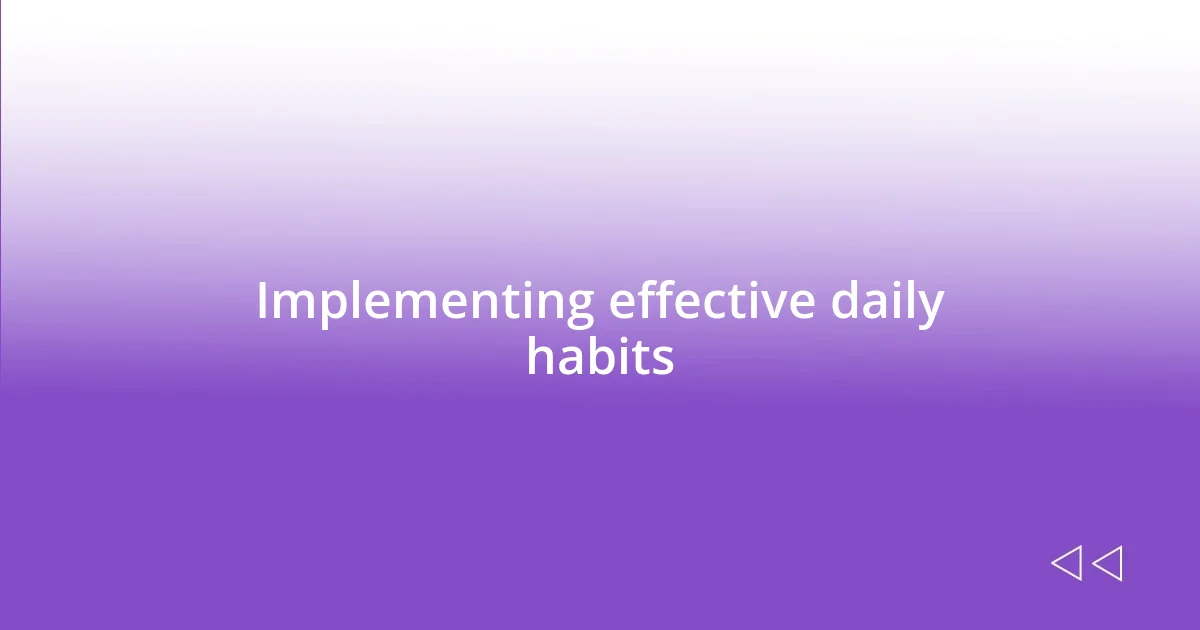
Implementing effective daily habits
Implementing effective daily habits has been a game-changer in my self-improvement journey. I remember when I started my mornings with a cup of coffee and immediately diving into emails. It wasn’t long before I realized this chaotic routine left me feeling frazzled rather than focused. So, I began establishing a morning ritual that included meditation and a short workout. This small shift has made me feel grounded and energized, setting a positive tone for the rest of the day.
One habit that transformed my productivity was time-blocking. At first, I was skeptical. Did I really need to schedule my day down to the minute? But once I tried it, the clarity it brought was undeniable. I began allocating specific time slots for tasks, which not only helped in minimizing distractions but also allowed me to commit to breaks. Have you ever noticed how a clear structure can elevate your focus? For me, reducing decision fatigue opened up mental space for more critical thinking.
There’s something magical about routine; it almost feels like a dance that you get better at over time. Now, I strive to end my day with a brief reflection on what I accomplished. I ask myself, “What worked well today, and what can I tweak for tomorrow?” This simple practice makes it easier to recognize patterns in my progress. In essence, cultivating daily habits that resonate with my goals has led me to understand that self-improvement is less about dramatic changes and more about consistent, thoughtful actions.
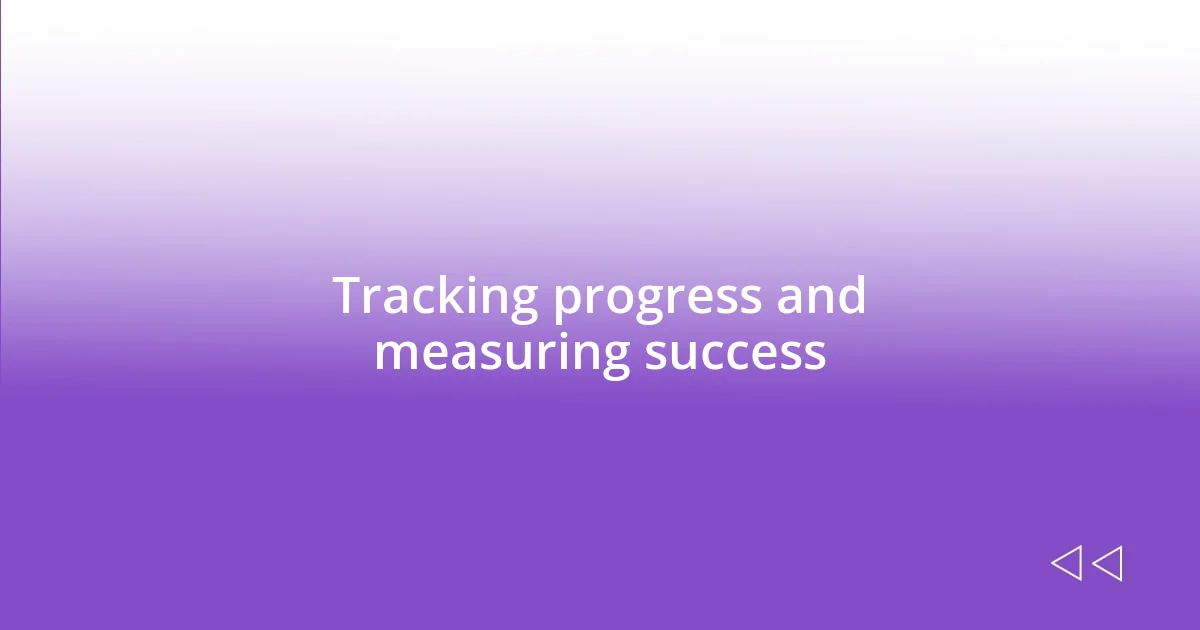
Tracking progress and measuring success
Tracking progress and measuring success is a vital part of any self-improvement journey. Personally, I find that using a journal to document my progress keeps me motivated and gives me a sense of accountability. There was a time when I felt like I was wandering aimlessly through my goals, but writing down my milestones transformed my perspective; I could see how far I had come, even in small increments. Have you ever experienced that rush of motivation when you look back and realize your growth?
I also utilize apps to track my habits, which adds an element of fun to my progress monitoring. Initially, I was hesitant, thinking that technology might complicate things even more. However, I was pleasantly surprised by how gamifying my goals turned my boring tasks into engaging challenges. Can you imagine turning your daily routines into a friendly competition with yourself? This shift not only enhanced my commitment but also encouraged me to celebrate my successes, both big and small, in a tangible way.
Success, I’ve learned, isn’t just the end goal; it’s also about appreciating the journey. Reflecting on my progress often leads me to discover insightful patterns. For instance, I noticed that I tend to thrive on Fridays, feeling particularly energized to tackle goal-related tasks. This realization allowed me to capitalize on that energy. Don’t you think understanding and measuring your own rhythms can lead to more effective self-improvement? Embracing this mindset not only fuels my motivation but reinforces that every step—regardless of size—plays a crucial role in my growth.
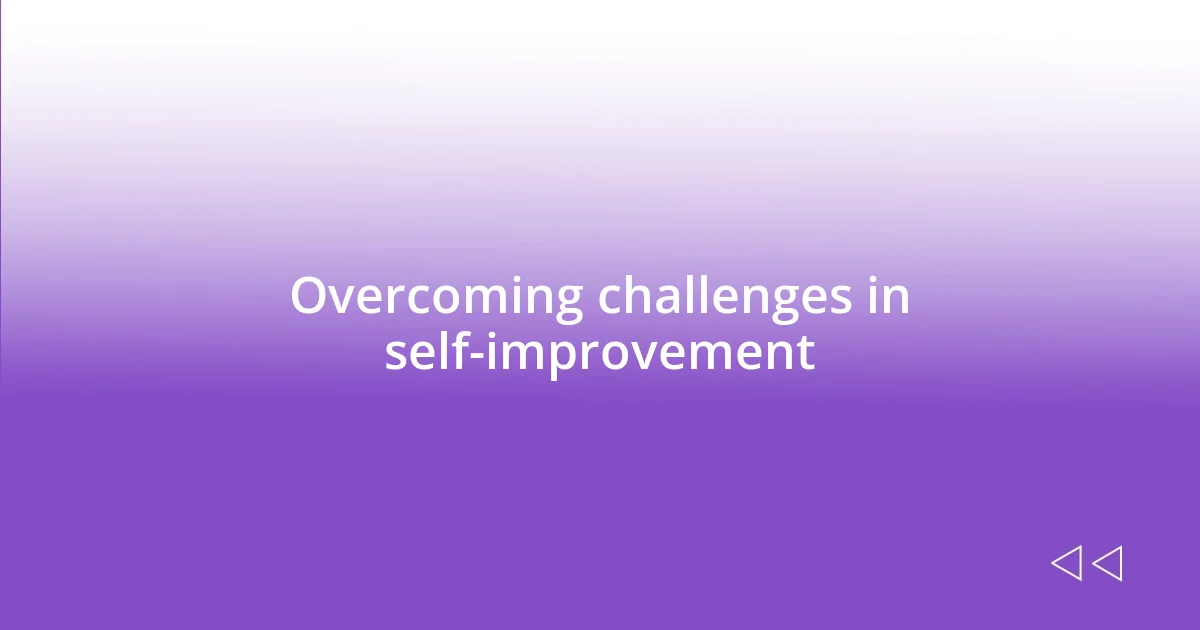
Overcoming challenges in self-improvement
Overcoming challenges in self-improvement often feels like navigating a maze. I’ve been there, stuck in a loop of self-doubt and frustration. I remember when I tried to establish a new writing routine but kept getting distracted by my phone. I had to confront that hurdle head-on. So, I decided to leave my phone in another room during writing sessions. Sometimes, it’s those simple decisions that lead to the breakthrough moments we desperately seek.
There were days when I didn’t see immediate results, and I thought about giving up. I’ve learned that perseverance is key. Last year, during my fitness journey, I hit a plateau after months of dedication. It felt disheartening, yet I reminded myself that progress isn’t always linear. I began to shift my mindset, focusing on smaller victories like feeling stronger or more energized, rather than merely the numbers on the scale. Have you ever had to reassess your goals to keep moving forward?
I also had to confront the inevitable backlash from my inner critic. It was challenging to keep going when negative self-talk crept in, especially after setbacks. When I realized this voice was merely a reflection of my fears rather than my reality, I made a conscious effort to replace that negativity with affirmations. On tough days, I still find myself saying, “I am on the right path,” as a reminder. How do you silence your inner critic when it tries to pull you down? Understanding that challenges are part of the journey has not only strengthened my resolve but also made the victories feel even sweeter.
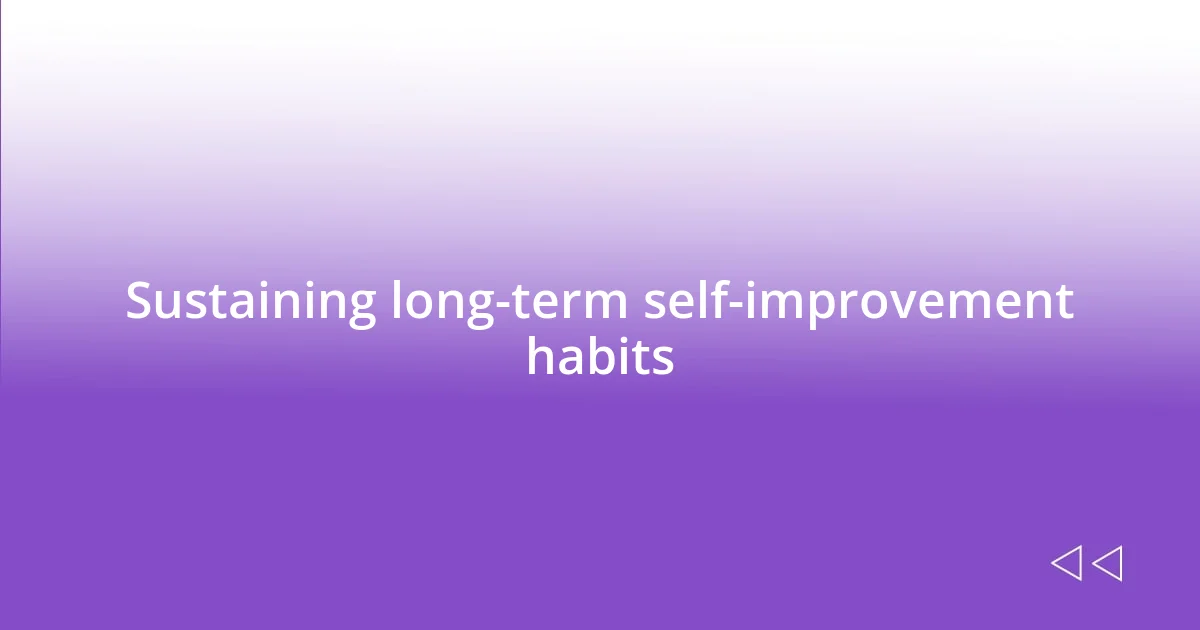
Sustaining long-term self-improvement habits
Sustaining long-term self-improvement habits isn’t just about sticking to a plan; it involves creating an environment that fosters growth. I remember starting a reading goal, aiming for one book a month. At first, it felt tedious, but I realized I had to make reading a part of my daily routine. I tucked a book into my bag and started reading during my commute. It’s amazing how those small moments can accumulate—what about you? Have you found ways to incorporate your goals into everyday life?
Another essential element for me has been accountability. I’ve experimented with sharing my goals with friends, and to my surprise, it transformed my approach. When I committed to a running challenge with a friend, it turned into something enjoyable rather than a chore. We would cheer each other on, which motivated me to stay consistent. How do you leverage the support of those around you? I find that surrounding myself with like-minded individuals has made a world of difference.
Finally, it’s crucial to be kind to yourself during this journey. I’ve had days when motivation waned, and that’s okay. I learned to recognize that slipping up doesn’t mean failure; it’s just part of the process. Once, after missing my weekly goals for a month, I allowed myself to feel the disappointment but then reframed it as an opportunity to pause and reassess my strategies. Have you tried forgiving yourself in moments of struggle? Understanding that self-improvement is a marathon, not a sprint, has taught me to embrace the twists and turns with grace.












